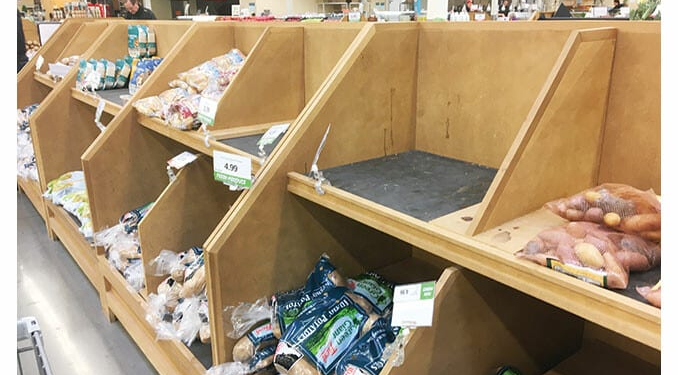The COVID-19 pandemic has put packaging at a premium, marketers say.
“We continue to see a shift towards consumers preferring packaged product,” said Ross Johnson, international marketing director with the Eagle-based Idaho Potato Commission.
In addition, some consumers, who might be feeling a financial pinch from the pandemic, are looking for value and are returning to larger-sized bags, Johnson said.
“Many regions across the country are seeing greater growth in the larger pack sizes — 8-pound, 10-pound, 15-pound-plus — than in the category leader 5-pound,” Johnson said.
“Since this differs between regions, we recommend a detailed analysis with our promotion directors in order to better understand what is happening in specific markets.”
The surge in demand for packaging stopped and even reversed a trend toward less plastic, said Jill Cox, vice president of sales with Sugar City, Idaho-based Sun-Glo of Idaho Inc.
“That’s interesting, because in the industry, all we’ve heard for years is we need to get rid of plastic,” she said.
“Then, COVID hit, and everybody wanted everything in plastic or shrink-wrap. I don’t know what’s going to be the final outcome from COVID, but things changed quickly. I know everybody talks about, ‘Let’s get rid of plastic because of what it does to the environment,’ but right now, everybody wants everything in bags.”
Demand for bags has, in some cases, outstripped available supplies, particularly when the U.S. Department of Agriculture launched its Farmers to Families Food Box program, Cox said.
“The Farmers to Families Food Box program helped keep production going, but our packaging companies were a long way out because of COVID,” she said.
“It affected their production because they had to shut down, too. Every part of our business was affected one way or another.”
The USDA initiative has been a factor, agreed Dallin Klingler, marketing and communications manager with Idaho Falls, Idaho-based Eagle Eye Produce.
“The Farmers to Families Food Box program has also compounded the issue, with more requests for small retail bags, which just means that packaging suppliers are increasing lead times and costs nationwide.”
Collinsville, Ill.-based bag maker Sev-Rend Corp. is seeing demand for packaged potatoes spike, said Jeff Watkin, marketing director.
“The pandemic has really shook up the produce world in regards to retail,” he said.
“Consumer packaging for fresh produce is in high demand, due to the strict regulations on restaurant operation at this time, along with consumer buying habits swiftly changing, as well.”
Consumers are eating at home more often now than before, and they are buying more potatoes per store visit than before, as they minimize their frequency of shopping trips, Watkin said.
“We have adapted, as well, to the surge in demand, with our main hurdles staying on top of raw materials for our styles of packaging we offer the market,” Watkin said.
“Our material purchasing team have been superstars at Sev-Rend lately, making sure there are adequate materials available so we do not see any gaps in production.”
Sev-Rend caught a break, of a sort, in that the pandemic has pushed the market toward the company’s style of packaging, which falls in a range of consumer packaging between 2 and 10 pounds, Watkin said.
“When the pandemic first started, people were trying to keep the store visits to a minimum; in turn, you saw many consumers buying a 3-pound bag of potatoes, where, in the past, they would grab possibly a couple of loose individual potatoes on that store visit,” Watkin said.
Union Gap, Wash.-based closure manufacturer Kwik Lok Corp. has responded to market demands during the pandemic, as well, said Karen Reed, marketing and communications director.
“Kwik Lok has been working to assure the safety of our employees and our ability to make sure we meet customer’s needs as they change in response to the pandemic,” she said.
“As a global company, we are able to leverage our knowledge from various locations and our resources to make sure we solve packaging needs seamlessly.”
Kwik Lok has worked with its potato customers in Idaho to develop a pre-printed closure that allows the grower to have their potato variety pre-printed on the closure, Reed said.
Kwik Lok is working with packaging makers to respond to new and increased demand, Reed noted.
“We definitely see customers responding to the need to keep food safe and easy to grab and go from the grocery store,” she said.
“At the same time, most brands with sustainability goals are not letting them slip and continue to strive to meet both health and safety needs and sustainability goals.”
Early in 2020, Kwik Lok introduced the “environmentally friendly” Eco-Lok, which the company says helps cut greenhouse gases and the use of plastic — “often two important goal areas for brands,” Reed said.





